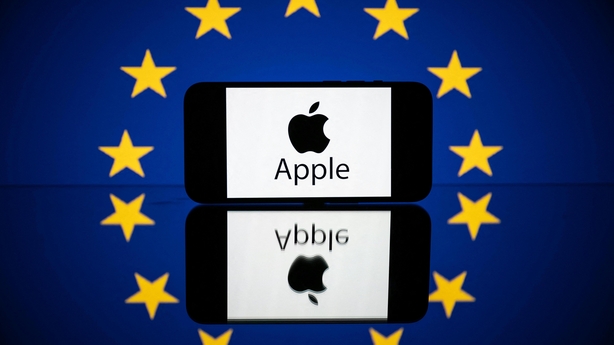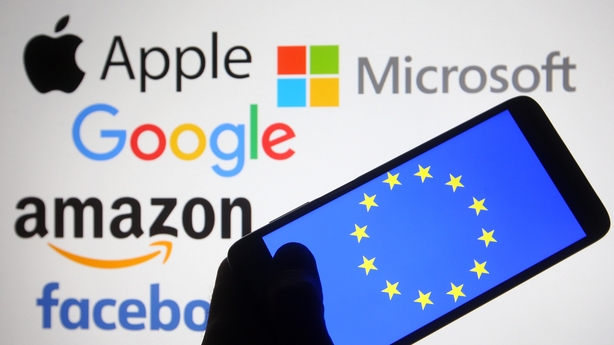The European Commission has formally designated six tech giants as "gatekeepers" under new rules designed to open up major online platforms to more competition to benefit consumers and businesses, and to end the alleged abuse of dominant market positions.
The six companies are Alphabet (which owns Google), Amazon, Apple, ByteDance (owner of TikTok), Meta and Microsoft.
Under the new rules, these companies will have to allow business users on their platforms greater freedom to reach consumers without facing restrictions, such as having to use particular smartphone applications.
The tech companies will have until March of next year to show they are in compliance with the new rules, which, although applicable in the European Union, are expected to have a considerable impact on the regulation of tech companies worldwide.
The six firms have been designated as gatekeepers in that they stand between business users and end consumers.
Individual services provided by the six digital giants have also been identified as gatekeepers due to their core platform services, such as messaging, social media, browsing, advertising and operating systems.

These include Facebook, Instagram, LinkedIn, YouTube, WhatsApp, Messenger, Google Maps, Google Play, Google Shopping, Chrome, Safari, Google Search, iOS, Windows PC OS. Amazon Marketplace and others.
The designations are part of the Digital Markets Act (DMA), a landmark piece of EU legislation which came into effect in May this year and which is designed to curb the market dominance of tech giants.
A sister piece of legislation, the Digital Services Act (DSA), is designed to counteract harmful practices online, such as interference in elections, the dissemination of fake content and the abuse of minors.
Fines for breaching the rules could be enormous, up to 10% of a company's global turnover, or 20% if there have been repeated infringements.
The new rules are designed to ensure that gatekeepers provide more freedom to those using their platforms, and to make it more difficult for them to gather personal data for advertising by tracking users online.
The tech giants will have to allow third parties to inter-operate with their services, allow business users to access the data generated when using the platform.
They will have to provide firms advertising on their platforms with the tools and information necessary for them to carry out their own independent verification of the impact of the adverts.
They will also have to allow business users to promote offers and conclude contracts with customers who do not operate on the gatekeeper's platform.
Tech giants will no longer be able to treat their products more favourably in ranking than similar products offered by third parties on the gatekeeper's platform.
Nor will they be allowed to prevent consumers from accessing businesses outside their platforms, or prevent them from uninstalling any pre-installed software or app.
Designated gatekeepers will also be prohibited from tracking end users outside their core platform in order to target consumers with advertising, without the express consent of those consumers.
"We all use Apple Pay," a senior EU official said.
"We can use the card of our bank. The point is that our bank, in order to be able to offer the service of an iPhone, needs to use a number of elements that only Apple can provide to them and Apple gets remunerated handsomely for it," the official added.

"On top, it imposes some constraints. So the user that today is using his card and thinks [they are] paying with a card or his bank is actually doing that, but inside the wiring in the software, there are a lot of restrictions that are imposed on this user," he said.
"What the DMA will want to do is to open up these restrictions, for example on the fact that others can access the antenna that allows the payment between the phone and the terminal and the point of service," he explained.
"Consumers will keep using their card, consumers will still see the same price at the till, but the payment service provider will probably save money so hopefully it comes back at some point to the buying public," he added.
The official said that other service providers may have "brilliant ideas" on payment systems but they are blocked from developing the idea because it is contrary to the existing contract rules imposed by big tech companies.
Big tech firms have been assessing the impact of the new legislation.
Apple said it remained concerned about privacy and security risks after it was designated a gatekeeper.
"Our focus will be on how we mitigate these impacts and continue to deliver the very best products and services to our European customers," the company said in a statement.
Microsoft said it accepted its designation as gatekeeper, while it welcomed the commission's decision to open an investigation into a possible exemption of Microsoft's services Bing, Edge and Microsoft Ads from the DMA.
Facebook parent company Meta said it was evaluating the commission's designation.
(Additional reporting by Reuters)







